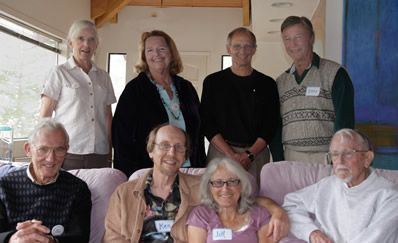Social Sciences Discussion
Share your interests and knowledge of various fields within social sciences: psychology, economics, politics, sociology and anthropology. Members take turns selecting a topic, providing discussion information, and then lead a discussion among participants. All viewpoints are welcome.
The social sciences group meets in person on the 3rd Tuesday of the month from 1:00 to 3:00 p.m. The group is currently full, but you can ask to have your name added to the waiting list for new openings as they occur.
Social Sciences Discussion Group I Leader: Dusty Miller, 831-426-0835, hndmiller@hotmail.com
 Many members feel that the Interest Groups are the “heart and soul” of our Lifelong Learning Institute. Each Interest Group is unique — some travel to art galleries, restaurants and wineries, while others focus on discussions in members’ living rooms. For example, the Social Sciences Discussion Group meets once a month for two hours and has lively discussions on interesting topics. How much fun is it? If you like stimulating discussions, the answer is LOTS. Here’s what the group has discussed in the past few months:
Many members feel that the Interest Groups are the “heart and soul” of our Lifelong Learning Institute. Each Interest Group is unique — some travel to art galleries, restaurants and wineries, while others focus on discussions in members’ living rooms. For example, the Social Sciences Discussion Group meets once a month for two hours and has lively discussions on interesting topics. How much fun is it? If you like stimulating discussions, the answer is LOTS. Here’s what the group has discussed in the past few months:
1) A hands-on experiment in behavioral economics, a relatively new field that studies our often-predictable irrational economic thinking and behavior, in contrast to traditional economics’ assumptions of “rational” behavior;
2) A look at affective neuroscience: With new brain scanning techniques and studies of neural systems in humans and other mammals, affective neuroscience is providing a much more scientifically satisfactory account of what emotions are and how they function;
3) How evolutionary psychology explains religion: it is either an evolutionary adaptation that improved humans’ survival or it is the result, or unintended consequence, of other adaptations that were useful in the success of homo sapiens as a species;
4) Do corporations control politics through contributions? Relatively minor campaign contributions are made by corporations or industries and almost all contributions are small and made by millions of individuals, so the recent U.S. Supreme Court decision on Citizens United is not likely to cause an important increase in corporate funding of election campaigns;
5) A discussion of the Turing test, the meaning of artificial intelligence, and whether or not computers can be evolved to the point where they can be considered “human”;
6) A discussion of three prominent theories of why some nations are much wealthier and more technologically advanced than others.
Each two-hour meeting is dedicated to one topic suggested by a group member. That member sends out reading material in advance via email, and leads the discussion.
The social sciences group meets in person on the 3rd Tuesday of the month from 1:00 to 3:00 p.m. The group is currently full, but you can ask to have your name added to the waiting list for new openings as they occur.
Social Sciences Discussion Group I Leader: Dusty Miller, 831-426-0835, hndmiller@hotmail.com
Good Times at the Social Sciences Group
 Many members feel that the Interest Groups are the “heart and soul” of our Lifelong Learning Institute. Each Interest Group is unique — some travel to art galleries, restaurants and wineries, while others focus on discussions in members’ living rooms. For example, the Social Sciences Discussion Group meets once a month for two hours and has lively discussions on interesting topics. How much fun is it? If you like stimulating discussions, the answer is LOTS. Here’s what the group has discussed in the past few months:
Many members feel that the Interest Groups are the “heart and soul” of our Lifelong Learning Institute. Each Interest Group is unique — some travel to art galleries, restaurants and wineries, while others focus on discussions in members’ living rooms. For example, the Social Sciences Discussion Group meets once a month for two hours and has lively discussions on interesting topics. How much fun is it? If you like stimulating discussions, the answer is LOTS. Here’s what the group has discussed in the past few months: 1) A hands-on experiment in behavioral economics, a relatively new field that studies our often-predictable irrational economic thinking and behavior, in contrast to traditional economics’ assumptions of “rational” behavior;
2) A look at affective neuroscience: With new brain scanning techniques and studies of neural systems in humans and other mammals, affective neuroscience is providing a much more scientifically satisfactory account of what emotions are and how they function;
3) How evolutionary psychology explains religion: it is either an evolutionary adaptation that improved humans’ survival or it is the result, or unintended consequence, of other adaptations that were useful in the success of homo sapiens as a species;
4) Do corporations control politics through contributions? Relatively minor campaign contributions are made by corporations or industries and almost all contributions are small and made by millions of individuals, so the recent U.S. Supreme Court decision on Citizens United is not likely to cause an important increase in corporate funding of election campaigns;
5) A discussion of the Turing test, the meaning of artificial intelligence, and whether or not computers can be evolved to the point where they can be considered “human”;
6) A discussion of three prominent theories of why some nations are much wealthier and more technologically advanced than others.
Each two-hour meeting is dedicated to one topic suggested by a group member. That member sends out reading material in advance via email, and leads the discussion.
